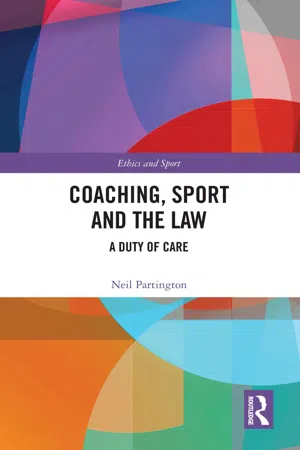
Coaching, Sport and the Law
A Duty of Care
Neil Partington
- 238 Seiten
- English
- ePUB (handyfreundlich)
- Über iOS und Android verfügbar
Coaching, Sport and the Law
A Duty of Care
Neil Partington
Über dieses Buch
The interdependent coach-athlete relationship represents the most fundamental instance of a duty of care in sport. This book defines, analyses and clarifies the duty of care incumbent upon sports coaches and identifies important recommendations of real-world significance for coaching practice.
Given the dynamic relationship between coaching, sport and the law, it is imperative that coaches have an informed awareness of the evolving legal context in which they discharge their duty of care. Detailed analysis of a coach's duty of care has so far been lacking. The book addresses this gap by being the first to critically scrutinise the concept of duty of care in the specific context of sports coaching. Sustained analysis of the developing case law allows the scope and boundaries of the particular duties demanded of coaches to be rigorously examined. The legal principles and court decisions discussed relate to coaching delivered in a wide range of individual and team sports, at both amateur and professional levels of performance, and include common scenarios and challenges frequently encountered by sports coaches globally.
By adopting an interdisciplinary approach within a broader sociolegal methodological framework, this book's detailed analysis and original insights will prove highly instructive for practising coaches, coach educators, and national governing bodies of sport. It also offers extremely valuable insights for students, teachers and practitioners involved in sports law, sports coaching, sports ethics, tort law, sports policy and development, sports studies and physical education.